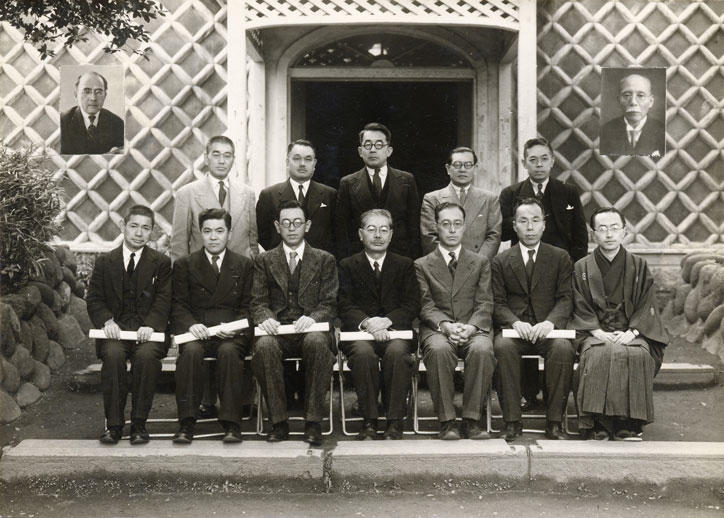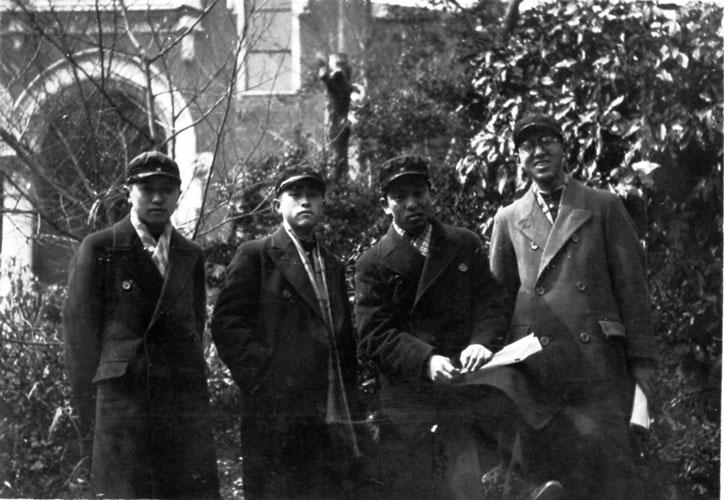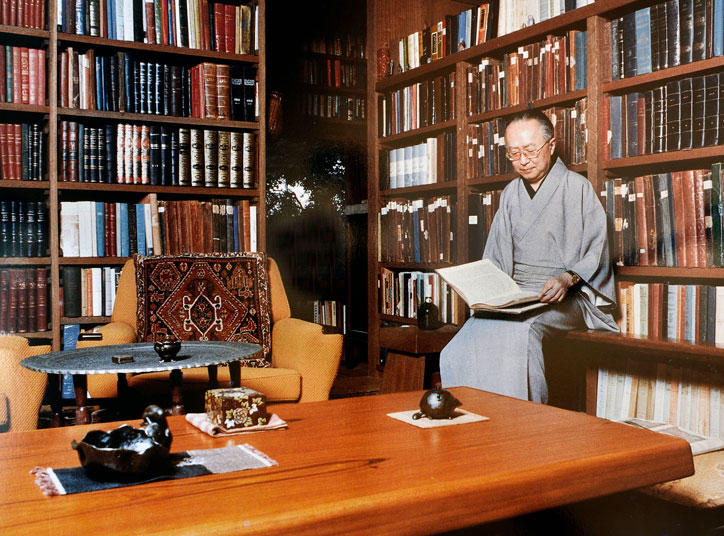
Follow the Author
Toshihiko Izutsu
Follow
Toward a Philosophy of Zen Buddhism Paperback – September 4, 2001
by Toshihiko Izutsu (Author)
4.2 out of 5 stars 13 ratings
Paperback
$21.32
9 Used from $13.0011 New from $17.32
Toward a philosophy of Zen Buddhism
by Izutsu, Toshihiko, 1914-
Publication date 1977
Topics Zen Buddhism -- Philosophy
Publisher Tehran : Imperial Iranian Academy of Philosophy
Collection inlibrary; printdisabled; trent_university; internetarchivebooks
Digitizing sponsor Kahle/Austin Foundation
Contributor Internet Archive
Language English
xii, 259 p. ; 23 cm. --
Includes bibliographical references and index
The true man without any rank.--Two dimensions of ego consciousness.--Sense and nonsense in Zen Buddhism.--The philosophical problem of articulation.--Thinking and a-thinking through kōan.--The interior and exterior in Zen.--The elimination of color in Far Eastern art and photography
There is a newer edition of this item:

Toward a Philosophy of Zen Buddhism.
$137.50
(13)
Zen experience defies all thinking and linguistic description and simply affirms what is evidently real: "The ordinary way—that precisely is the Way." After questioning the nature of reality, the Zen student discovers that what remains is what is. Although it seems that Zen would not lend itself to philosophical discussion, that all conceptualization would dissolve in light of this empiricism, in this volume, the author demonstrates that the "silence" of Zen is in fact pregnant with words.
A variety of topics are discussed: the experience of satori, ego and egolessness, Zen sense and nonsense, koan practice, the influence of Zen on Japanese painting and calligraphy and much more.
Print length272 pages
PublisherShambhala
Publication dateSeptember 4, 2001
Editorial Reviews
From the Back Cover
Zen experience defies all thinking and linguistic description and simply affirms what is evidently real. "The ordinary way -- that precisely is the Way". After questioning the nature of reality, the Zen student discovers that what remains is what is. Although it seems that Zen would not lend itself to philosophical discussion, that all conceptualization would dissolve in light of this empiricism, in this volume, the author demonstrates that the "silence" of Zen is in fact pregnant with words.
A variety of topics are discussed: the experience of satori, ego and egolessness. Zen sense and nonsense, koan practice, the influence of Zen on Japanese painting and calligraphy and much more.
About the Author
Toshihiko Izutsu is Professor Emeritus at Keio University of Japan. He has been active in promoting transcultural dialogue in philosophy.
Product details
Publisher : Shambhala; Illustrated edition (September 4, 2001)
4.2 out of 5 stars 13 ratings
Customer reviews
4.2 out of 5 stars
Top reviews from the United States
PW108
5.0 out of 5 stars Profound and Illuminating Essays on the Essence of ZenReviewed in the United States on January 6, 2022
Verified Purchase
This is the third book by Toshihiko Izutsu that I have had the pleasure of reading, and as it was with the others, I could not move on to another book without first taking time to leave a 5-star review for it. In my estimation, no list of the 20th century’s greatest philosopher-authors and/or religious scholars would be worth much without Professor Izutsu on it. The essays here, along with his other two texts that I have previously read (and appreciatively reviewed) — “Sufism and Taoism: A Comparative Study of Key Philosophical Concepts” and “Creation and the Timeless Order of Things: Essays in Islamic Mystical Philosophy” — have left me feeling that he was one of the most precise and eloquent writers on philosophy and religion that I have encountered.
This collection of seven essays, representing his talks and writings from the late 1960’s and early-mid 1970’s, are seamlessly woven together to provide the reader with a wide-ranging yet detailed look at Zen’s major philosophical themes and its greatest Masters, along with its famously bizarre mondos and koans, which are designed to foment Enlightenment.
In particular,
- I found Essay #1, “The True Man Without Any Rank” with its descriptions of the egoic structure (along with the mind’s bifurcation of Nondual Existence into a dualistic, subject-object perception of reality) to be one of the best on this important topic that I have ever encountered.
- Essay #4, “The Philosophical Problem of Articulation” provides the reader with an excellent examination of the inherent difficulties in utilizing language (which is unavoidably dualistic) to convey the ineffable and ultimately impossible to fully describe nature of Zen’s Satori, and the mystical experience in general.
- Lastly, I found Essay # 5, “Thinking and A-Thinking Through Koan” and Essay #6, “The Interior and Exterior in Zen” to be fascinating deep dives into the nature of nondual awareness-experience and the inescapable considerations that go with it.
If you’re looking at this book, you are likely already familiar with Izutsu’s work, and therefore you don’t need me to tell you that his efforts to disseminate the essential tenets of Islam-Sufism, Taoism, and Zen Buddhism were top-of-the-line. However, if you’ve just found this book and are considering purchasing it, then I would say that if you have a sincere interest in what Professor Izutsu wrote about (in this case Zen), then this book will not disappoint. For anyone looking at furthering their conceptual understanding of Zen and its highly unique “technologies” for awakening its practitioners from the dream state of samsara, I am enthusiastically recommending “Toward a Philosophy of Zen Buddhism.”
One person found this helpful
HelpfulReport abuse
GA Hans
5.0 out of 5 stars Clear, dense, full of ZenReviewed in the United States on May 7, 2019
More than philosophical, a logical approach to Zen. Toshihiko Izutsu has a wonderful, clear style of writing and explains Zen concepts that can be instantly grasped. One of the best books on Zen I have ever read! Right up there with D.T. Suzuki.
===
HelpfulReport abuse
Michael Hall
4.0 out of 5 stars Four StarsReviewed in the United States on August 4, 2015
Verified Purchase
An excellent attempt to make Zen understandable in the context of western philosophical thought.
===
HelpfulReport abuse
Steven P. Champagne
5.0 out of 5 stars Philosophy of Zen BuddhismReviewed in the United States on February 16, 2008
Verified Purchase
An extremely well written and well organized explanation in Western terms
of the processes of the Zen Buddhism experience. I highly recommend this book
to further your understanding of Zen.
6 people found this helpful
HelpfulReport abuse
Human.Being.
5.0 out of 5 stars Profoundly enlightening and well-written.Reviewed in the United States on June 2, 2015
Profound, brilliant, and insightful. Izutsu's work captures the quintessence of Being in a well-written and enlightened manner. If you are seeking Knowledge, then this is one of those books that will stay with you for life.
3 people found this helpful
====
Top reviews from other countries
Amazon Customer
5.0 out of 5 stars Thoroughly enjoyed reading this bookReviewed in the United Kingdom on April 6, 2017
Verified Purchase
Toshihiko Izutsu has done a marvelous job in explaining the nuts and bolts of Zen thought.
Thoroughly enjoyed reading this book.
===








